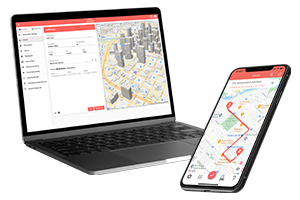Last updated: April 12, 2024
Hop in, folks! It’s time to hit the road of tax deductions. We’re cruising at 67 cents per mile this year, so buckle up and let’s take a joy ride through the ins and outs of the 1099 mileage deduction.

A Gas Tank Half Full or Half Empty? Understanding the 1099 Mileage Deduction
No doubt about it, being a 1099 worker comes with its fair share of bumps in the road. But, there’s a silver lining hiding in your gas tank! You’ve probably heard whispers about the 1099 mileage deduction. Now, you might be scratching your head, thinking, “What’s the big deal about keeping track of my miles?” Buckle up, dear reader, because this is one journey you don’t want to miss out on.
A Penny Saved is a Penny Earned: The 1099 Mileage Deduction
It’s all about that Benjamin – or rather, a good chunk of Benjamins. As a 1099 contractor, each business-related mile you drive puts a shiny penny (well, 67 of ’em, to be exact) back in your pocket in 2024. That’s right, the 2024, 1099 mileage deduction rate is a whopping 67 cents per mile. Think of it this way: every mile is a small treasure chest you can stash away come tax time.
Pit Stop: Who Can Claim the 1099 Mileage Deduction?
Hold your horses! Before you start daydreaming about all those pennies adding up, let’s make sure you’re eligible to claim the 1099 mileage deduction. This pit stop is for the self-employed, freelancers, gig workers, and independent contractors. If you’re shaking hands with Uncle Sam under a 1099 agreement, you’re in the right place.
Filling Out the Paperwork: The Schedule C (Form1040)
The open road is fantastic, but every ride requires a pit stop. For 1099 mileage deductions, that pit stop is the Schedule C (Form 1040). This handy piece of paper is where you record your mileage and claim your deductions. It’s a tax form, yes, but think of it as a roadmap guiding you to your treasure trove of deductions.
Green Light: How to Claim the 1099 Mileage Deduction
As they say, the devil is in the details. It’s not enough to just tell the IRS, “Trust me, I drove a lot!” They’re going to need some proof. And that’s where MileageWise becomes your co-pilot.
How to Calculate Your Deduction with a 1099 Mileage Deduction Calculator
Calculating your deduction might seem tricky, but it’s made easier with a 1099 mileage deduction calculator. This tool helps you determine how much you can deduct based on the standard IRS mileage rates. For instance, the 1099 mileage deduction 2023 rate is 65.5 cents per mile and the 2024 it is 67 cents.
FAQs About 1099 Mileage Deductions
- Q: Can I claim mileage on my 1099?
- A: Yes! If you’re a 1099 contractor, you can claim mileage for business-related trips.
- Q: What if I’m a 1099 employee?
- A: As a 1099 employee, the mileage for 1099 employees rule allows you to deduct your business mileage too.
- Q: Can a 1099 employee write off mileage?
- A: Yes, as a 1099 independent contractor, you can deduct business-related mileage on your taxes. This includes travel for meetings, job sites, and other work-related activities. However, commuting miles are not deductible. To claim this deduction, keep a detailed log of your business trips, including dates, distances, and purposes, and use either the IRS’s standard mileage rate or actual vehicle expenses for the calculation.
Start Your Journey of IRS-Proof Logging
Mileage Reimbursement vs. Mileage Deduction
There’s a difference between mileage reimbursement for 1099 employees and taking a mileage deduction. Reimbursements are when your client or employer pays you back for mileage. However, reporting mileage reimbursement on 1099 is not required if it’s done under an accountable plan. Otherwise, it might be considered income.
1099 Gas Mileage Deduction: The Nitty-Gritty
The 1099 gas mileage deduction is part of the overall mileage deduction and focuses specifically on the fuel cost for business travel. Remember, it’s more beneficial to use the standard mileage rate, which already accounts for gas, depreciation, and wear and tear.
Tips for Maximizing Your 1099 Mileage Tax Deduction
- Keep Detailed Records: Log every business-related trip with dates, mileage, and purpose.
- Understand Eligible Trips: Not all driving counts. Commuting, for instance, is not deductible.
- Stay Informed: Keep up with the latest IRS updates, as rates and rules can change yearly.
In summary, for 1099 contractors, learning how to deduct mileage and understanding the 1099 mileage tax deduction can lead to significant savings at tax time. Whether you’re tracking your miles for reimbursement or preparing to write off mileage, staying informed and organized is key.
Your Road Trip Companion: MileageWise
Talk about your guardian angel on the highway! With MileageWise, you’ve got the best co-pilot for keeping track of your miles and helping you nab that 1099 mileage deduction. It’s the tool of choice for 1099 employees because it creates 100% IRS-Proof mileage logs.
Going the Extra Mile with MileageWise
Not only does MileageWise make understanding 1099 mileage deductions a breeze, but it also guides you through the process of maximizing those deductions. It’s like having a savvy accountant riding shotgun, helping you navigate the complex twists and turns of tax season.
Now, let’s face it, taxes are about as exciting as watching paint dry. But when it comes to putting money back into your pocket, we’re all ears (and wallets). The 1099 mileage deduction is a key tool in your tax-saving arsenal. And with MileageWise on your side, you’ll be ready to ride into the sunset, knowing you’ve claimed every penny that’s rightfully yours. So, tighten that seatbelt and get ready to zoom through tax season!
Download MileageWise’s automatic mileage tracker app from Google Play or the App Store & try it for free for 14 days. No credit card required!



